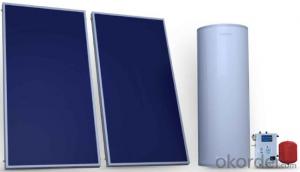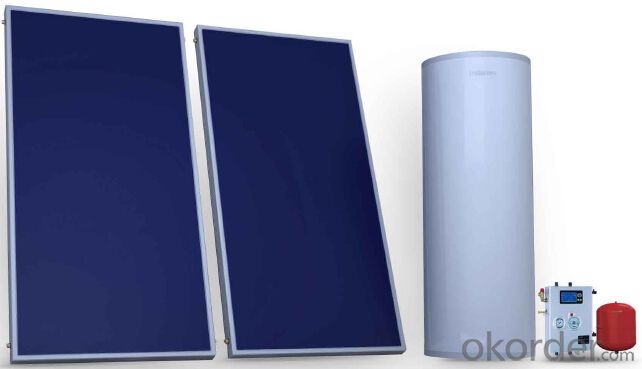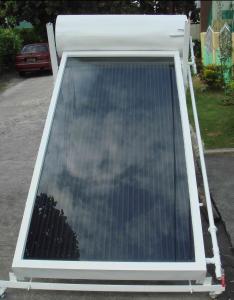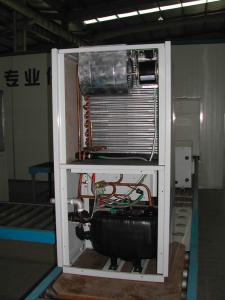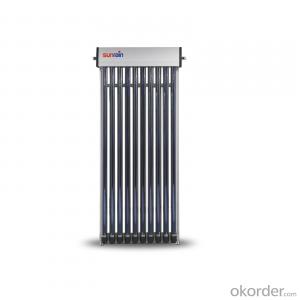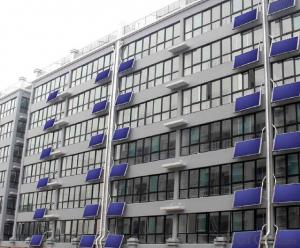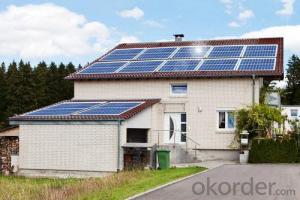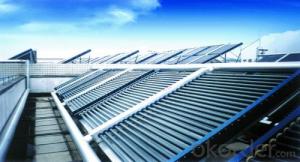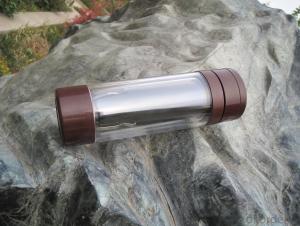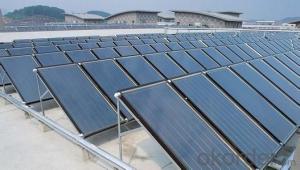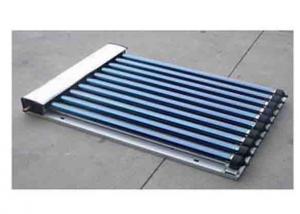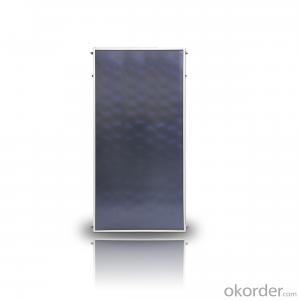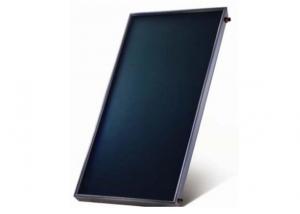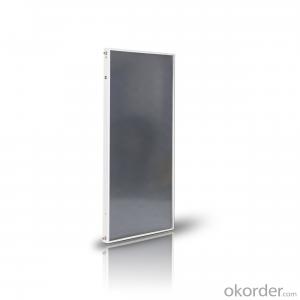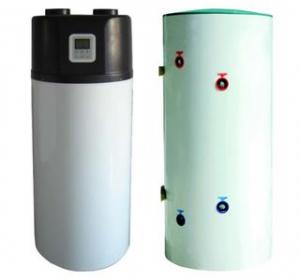Solar Water Heater for Home - Split Solar Water Heating System (Standard)
- Loading Port:
- Tianjin
- Payment Terms:
- TT OR LC
- Min Order Qty:
- 1 set
- Supply Capability:
- 50 set/month
OKorder Service Pledge
OKorder Financial Service
You Might Also Like
1. Structure of Split Solar Water Heating System(Standard)
Our Split Solar Water Heating System has two versions: standard and luxury. Compared to compact type solar water heating system, split solar water heating system can offer enough water for need and manage to supply hot water to divers spots like in kitchen, bathroom and so on. Then split solar water heating system can be installed in the balcony, on the wall or rooftop, which can avoid the difficulty of installation on high building. Split solar water heating system is a kind of synthetical energy saving system, suitable for different kinds of architectural style, and as a technology indenpendent to urban energy saving requirment, it is ideal supporting facilities for real estate developpment. Morever, we have obtained produts certificate as follows:

2. Main Features of Split Solar Water Heating System(Standard)
large wter tank to ensure enough water supply
adopt multiple modularized insulation technoloty
seamless integration with modern architecture
split water compression system and induced force circulations to increase heat exchange rate
3. Split Solar Water Heating System (Standard) Images
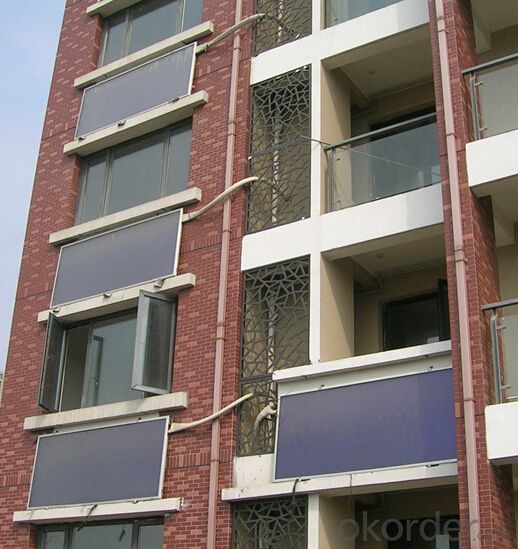
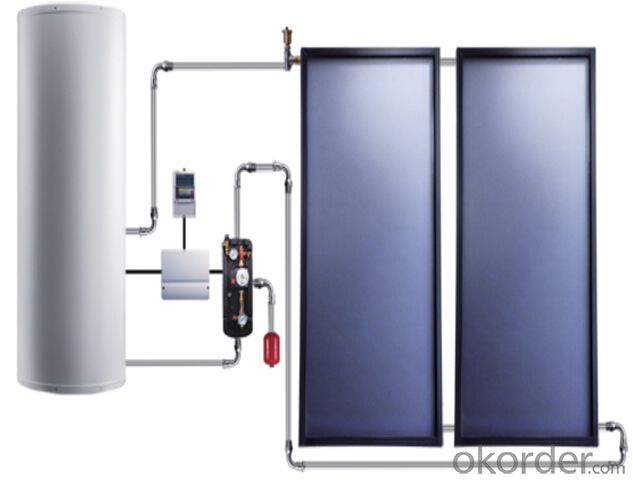
4. Split Solar Water Heating System (Standard) Specification
| Model | Volume(L) | Tank Dimension(mm) | Solar Collector Model | Collecting Area (m2) | Gadget |
| PJF-2-200-2 | 200 | φ520×1517 | P-G/0.6-L/LT-1.8-201 | 4 | pressure expansion tank, controller, water pump |
| PJF-2-270-2 | 270 | φ620×1397 | P-G/0.6-L/LT-1.8-201 | 4 | pressure expansion tank, controller, water pump |
5. FAQ
(1) Do you have operation and installation manual for guide?
Yes, we have booklet with the products in the package. If you still have problems, you can email us for help.
(2)Can the prducts be modified?
Yes, the products can be modified according to specific requirement , and we would like to suggest you contacting with our technicist for more details.
(3) How long can the customer get the goods?
Honestly speaking, it depends on the quantity of your order, the way of delivery and other factors that concerns about it. But if your purchase for a large amount, it is possible to give the customer some discount in price.
- Q: Can a solar water heater be used in areas with limited access to energy conservation programs?
- Yes, a solar water heater can indeed be used in areas with limited access to energy conservation programs. Unlike traditional water heaters that rely on electricity or gas, solar water heaters operate solely on sunlight, making them a sustainable and efficient choice for areas with limited energy resources. They can significantly reduce energy consumption and costs, providing a reliable and environmentally friendly solution for heating water even without access to energy conservation programs.
- Q: How does the pipe diameter affect the performance of a solar water heater?
- The pipe diameter affects the performance of a solar water heater by influencing the flow rate and pressure of the water circulating through the system. A larger diameter pipe allows for a higher flow rate, which can improve the system's efficiency and reduce the time required to heat the water. On the other hand, a smaller diameter pipe can lead to increased resistance and pressure drop, potentially reducing the overall performance of the solar water heater. Therefore, selecting an appropriate pipe diameter is crucial to optimize the system's performance.
- Q: How much does it cost to install a solar water heater?
- The cost of installing a solar water heater can vary depending on various factors such as the size of the system, location, complexity of installation, and any additional components or upgrades. On average, the cost can range from $2,500 to $7,500, including installation. However, it is recommended to obtain quotes from reputable installers to get a more accurate estimate for your specific requirements.
- Q: Can a solar water heater be used in areas with strict homeowners' association rules?
- A solar water heater is permissible in areas with strict homeowners' association rules. However, it is advisable to carefully review the rules and regulations of the specific homeowners' association to ensure compliance. Certain associations may impose limitations on the visibility or placement of solar panels, thus it is crucial to consult with the association or obtain approval prior to installation. On occasion, homeowners' associations might have guidelines or limitations concerning the appearance of the solar water heater, such as mandating integration into the house's architecture or concealment from sight. Ultimately, it is recommended to reach out to the homeowners' association and discuss the potential for installing a solar water heater, as they may have established specific guidelines to accommodate renewable energy systems.
- Q: Can a solar water heater be used in areas with high levels of air pollution from mining activities?
- Yes, a solar water heater can still be used in areas with high levels of air pollution from mining activities. The functionality of a solar water heater is not directly affected by air pollution. However, it is important to regularly clean and maintain the solar panels to ensure optimal performance and efficiency, as air pollution can potentially reduce the amount of sunlight reaching the panels.
- Q: Can a solar water heater be used in areas with limited access to energy audits and assessments?
- Yes, a solar water heater can be used in areas with limited access to energy audits and assessments. Solar water heaters are relatively simple and straightforward systems that do not require advanced energy audits or assessments for installation and operation. They primarily rely on the sun's energy to heat water, making them suitable for areas with abundant sunlight. While energy audits and assessments can provide useful insights for optimizing energy efficiency, solar water heaters can still be implemented and used effectively even without these assessments.
- Q: How does the design of the solar collector affect the efficiency of a solar water heater?
- The design of the solar collector plays a crucial role in determining the efficiency of a solar water heater. The efficiency of a solar water heater is primarily determined by the amount of solar energy that can be captured and converted into usable heat. One important factor in the design is the size and surface area of the collector. A larger surface area allows for more solar radiation to be absorbed, increasing the amount of heat that can be transferred to the water. Additionally, the shape and orientation of the collector can also impact efficiency. A well-designed collector will be able to capture sunlight effectively throughout the day, maximizing the energy available for heating the water. The material used in the collector is another important consideration. The most common type of solar water heater utilizes flat-plate collectors, which consist of a dark absorber plate covered by a transparent cover. The absorber plate is made of a material with high thermal conductivity and absorption, such as copper or aluminum. These materials are able to efficiently absorb solar radiation and transfer the heat to the water. The design of the fluid flow within the collector is also critical. The fluid, typically water or a heat-transfer fluid, circulates through the collector to absorb the heat from the absorber plate and carry it to the storage tank. The flow rate and pattern within the collector must be optimized to ensure efficient heat transfer. A well-designed collector will minimize heat losses due to conduction, convection, and radiation, allowing for maximum heat transfer to the water. Furthermore, the insulation and glazing of the collector also impact efficiency. The insulation should be able to minimize heat losses from the collector, especially during periods of low solar radiation or at night. The glazing, typically made of glass or plastic, serves to trap the heat within the collector while also allowing sunlight to pass through. The choice of glazing material and its transparency properties can affect the amount of solar radiation that is transmitted into the collector and the amount of heat that is retained. In conclusion, the design of the solar collector has a significant impact on the efficiency of a solar water heater. Factors such as size, shape, material, fluid flow, insulation, and glazing all contribute to how effectively solar energy is captured and converted into usable heat. By optimizing these design elements, the efficiency of a solar water heater can be greatly improved, leading to a more sustainable and cost-effective solution for heating water.
- Q: How does the warranty of a solar water heater compare to a traditional water heating system?
- The warranty of a solar water heater generally tends to be longer and more comprehensive compared to a traditional water heating system. This is primarily because solar water heaters have fewer moving parts and are designed to be more durable and reliable. Additionally, the components of a solar water heater, such as the solar panels and storage tanks, often come with separate warranties, offering additional peace of mind for consumers.
- Q: How much space is required for storing hot water in a solar water heater system?
- The space required for storing hot water in a solar water heater system can vary depending on the size of the system and the demand for hot water. Generally, a typical solar water heater system may require a storage tank with a capacity of 40-80 gallons (150-300 liters) to store the heated water.
- Q: How does a solar water heater affect the aesthetics of a building?
- A solar water heater can have both positive and negative effects on the aesthetics of a building. On one hand, the presence of solar panels on the roof or walls can be seen as an eco-friendly and sustainable addition, enhancing the overall appeal and modernity of the building. This can also send a positive message about the owner's commitment to renewable energy. On the other hand, some people may find the appearance of solar panels to be unsightly or disruptive to the building's visual harmony, especially if they are not integrated into the design seamlessly. Ultimately, the impact on aesthetics depends on the design and placement of the solar water heater system.
Send your message to us
Solar Water Heater for Home - Split Solar Water Heating System (Standard)
- Loading Port:
- Tianjin
- Payment Terms:
- TT OR LC
- Min Order Qty:
- 1 set
- Supply Capability:
- 50 set/month
OKorder Service Pledge
OKorder Financial Service
Similar products
Hot products
Hot Searches
Related keywords
